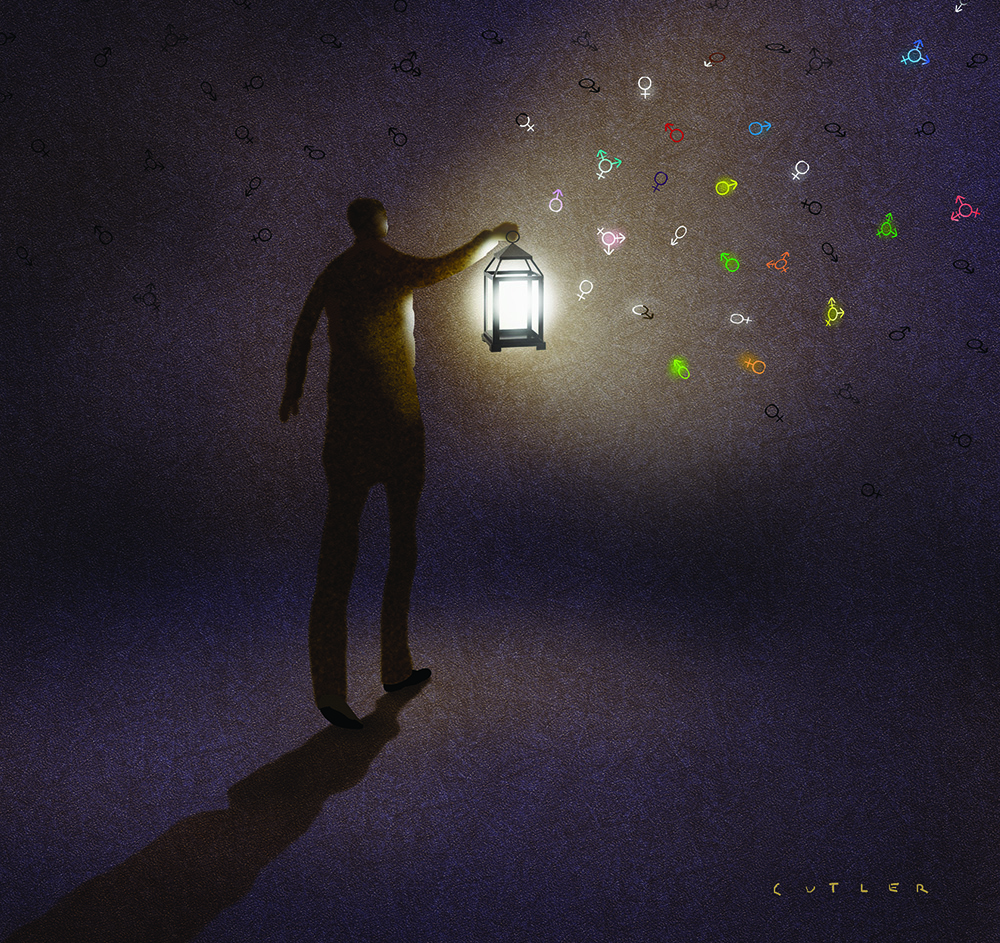
By Lydia Lum, illustration by Dave Cutler
For years, SF State Professor of Psychology John De Cecco taught a class that became so popular his lectures had be to be moved to the Creative Arts building’s McKenna Theatre. What could have so many SF State students — up to 800 at a time — so fascinated?
You can probably guess.
“Variations of Human Sexuality” was the most famous course taught by De Cecco (pronounced di-CHECK-o), the primary founder of SF State’s Sexuality Studies program. In addition to plain old-fashioned sex, the class explored such once-taboo topics as masturbation, cross dressing and pornography (which De Cecco sometimes discussed in class during visits from porn star and SF State alum Nina Hartley). When Professor of Health Education John Elia (B.A. ’86; M.A. ’89) took the course in 1981, De Cecco — who died last November at age 92 — required that students keep journals documenting their experience.
“The class definitely helped people open up and face our disconnected feelings,” says Elia, who’s also associate dean of the College of Health & Social Sciences.
Because of De Cecco’s pioneering efforts, the University has been a longtime leader in sexuality studies.
“We wouldn’t be where we are today without him,” says Associate Professor of Sociology Andreana Clay, who is also chair of the Department of Sociology and Sexuality Studies. The University’s sexuality studies and sociology programs merged in 2012 to form one of very few stand-alone sexuality studies programs nationally. (Most counterparts at other U.S. universities are housed within women’s or gender studies.)
SF State offers a master’s degree in sexuality studies and, for undergraduates, a minor in the discipline and another in LGBT studies. During the last academic year, general education courses included “Sex and the Law,” “Homophobia and Coming Out” and “50 Years of Sex in the Media.” The “Variations” course is still around, as well.
“A lot has been built here, thanks to De Cecco,” Clay says.
Raised Catholic in his native Pennsylvania, De Cecco began his career as an educator in the Midwest. A closeted gay man, he snagged a job offer from SF State in 1960. Though San Francisco was emerging as an LGBT mecca at the time, the University, like many others nationally, was far less progressive.
“We were not some gay paradise,” says Elia. “There was resistance on campus to LGBT people and causes.”
Although De Cecco had off-campus friends who freely acknowledged their sexuality, he remained closeted when he left in 1968 for a two-year research stint in New York City. That put him at ground zero for the Stonewall riots of 1969, during which angry demonstrators protested a police raid on a gay club in Greenwich Village. The experience changed De Cecco forever.
After returning to SF State, he and like-minded professors banded together to launch interdisciplinary courses that blended sexuality with areas such as biology, history and creative arts. Along the way, the University secured federal funding to study discrimination against sexual minorities. De Cecco became the project’s primary investigator. In 1975, when he was tapped to edit The Journal of Homosexuality, an international, peer-reviewed publication, he decided to come out to relatives and colleagues. And he didn’t just come out of the closet: He took off the toupee he’d been wearing for years, as well.
“The balding head was his show of honesty,” Elia says.
The years to come weren’t without controversy, but De Cecco faced them openly and boldly. No more closets (or rugs) for him. He would keep pushing boundaries and influencing students and colleagues until his retirement from SF State in 2003.
“We didn’t have to dissect frogs, and it was much more interesting than biology would have been,” says Professor of Sexuality Studies Colleen Hoff (B.A. ’86), who took “Variations” to fulfill a science requirement. As director of SF State’s Center for Research and Education on Gender and Sexuality, Hoff leads efforts to collect and distribute information about topics such as transgender people, children who survive sex crimes and how to interact with female breast cancer patients who are no longer comfortable being touched. These and other socially significant pursuits might not have been possible without De Cecco paving the way.
“We owe John a big thanks,” Elia says. “As difficult as his professional path was, his work wouldn’t have happened at most other universities.”